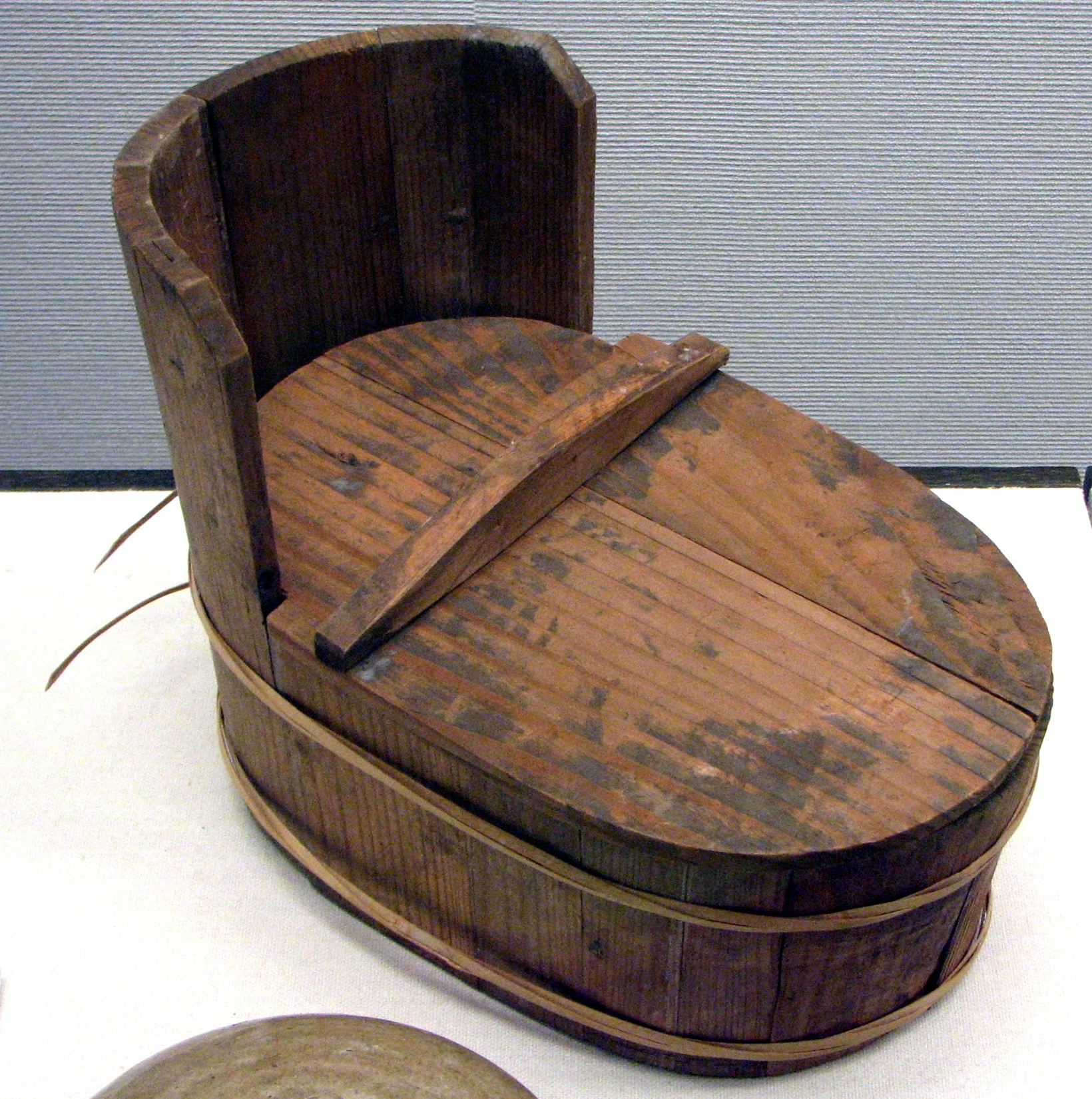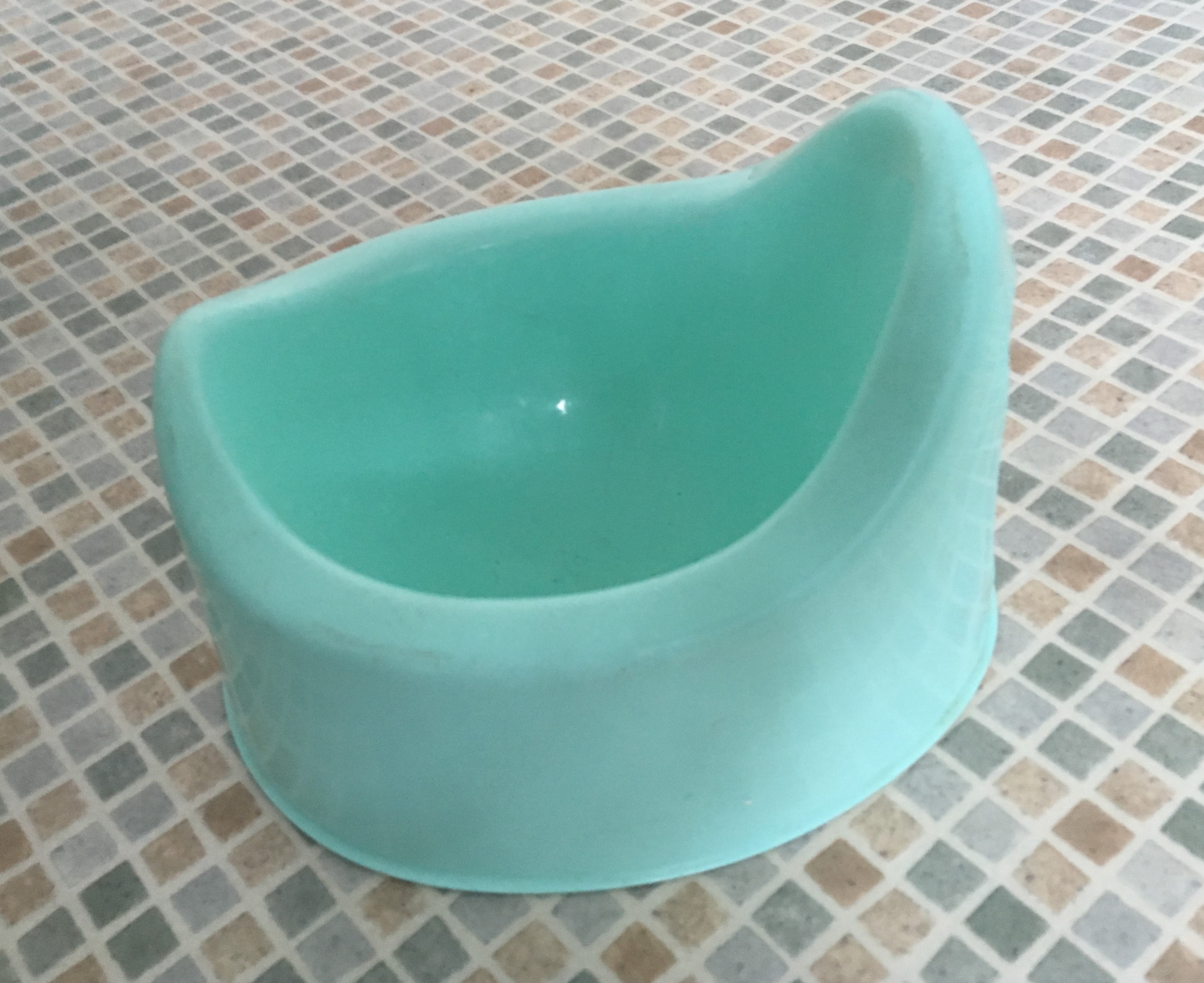Chamberpot on:
[Wikipedia]
[Google]
[Amazon]

 A chamber pot is a
A chamber pot is a
 Chamber pots continue in use in areas lacking indoor plumbing.
In the Philippines, chamber pots are used as
Chamber pots continue in use in areas lacking indoor plumbing.
In the Philippines, chamber pots are used as
 The term "potty" is used when discussing the
The term "potty" is used when discussing the

 A chamber pot is a
A chamber pot is a portable toilet
A portable or mobile toilet (colloquial terms: thunderbox, portaloo, porta-john or porta-potty) is any type of toilet that can be moved around, some by one person, some by mechanical equipment such as a truck and crane. Most types do not require ...
, meant for nocturnal use in the bedroom. It was common in many cultures before the advent of indoor plumbing
Tap water (also known as faucet water, running water, or municipal water) is water supplied through a tap, a water dispenser valve. In many countries, tap water usually has the quality of drinking water. Tap water is commonly used for drinking, ...
and flushing toilet
A flush toilet (also known as a flushing toilet, water closet (WC) – see also toilet names) is a toilet that disposes of human waste (principally urine and feces) by using the force of water to ''flush'' it through a drainpipe to another lo ...
s.
Names and etymology
"Chamber" is an older term for bedroom. The chamber pot is also known as a , a jerry, a guzunder, a po (possibly from french: pot de chambre), a potty pot, a potty, a thunder pot or a thunder mug. It was also known as a chamber utensil or bedroom ware.History
Chamber pots were used inancient Greece
Ancient Greece ( el, Ἑλλάς, Hellás) was a northeastern Mediterranean Sea, Mediterranean civilization, existing from the Greek Dark Ages of the 12th–9th centuries BC to the end of Classical Antiquity, classical antiquity ( AD 600), th ...
at least since the 6th century BC and were known under different names: (''amis''), (''ouranē'') and (''ourētris'', from - ''ouron'', "urine"), / (''skōramis''), (''chernibion'').
The introduction of indoor flush toilet
A flush toilet (also known as a flushing toilet, water closet (WC) – see also toilet names) is a toilet that disposes of human waste (principally urine and feces) by using the force of water to ''flush'' it through a drainpipe to another loca ...
s started to displace chamber pots in the 19th century, but they remained common until the mid-20th century. The alternative to using the chamber pot was a trip to the outhouse
An outhouse is a small structure, separate from a main building, which covers a toilet. This is typically either a pit latrine or a bucket toilet, but other forms of dry (non-flushing) toilets may be encountered. The term may also be used ...
.
In China, the chamber pot (便壶 (biàn hú) was common. A wealthy salt merchant in the city of Yangzhou became the symbol of conspicuous excess when he commissioned a chamber pot made of gold which was so tall that he had to climb a ladder to use it.
Modern use
urinal
A urinal (, ) is a sanitary plumbing fixture for urination only. Urinals are often provided in public toilets for male users in Western countries (less so in Muslim countries). They are usually used in a standing position. Urinals can be ...
s and are known as ''arinola'' in most Philippine languages
The Philippine languages or Philippinic are a proposed group by R. David Paul Zorc (1986) and Robert Blust (1991; 2005; 2019) that include all the languages of the Philippines and northern Sulawesi, Indonesia—except Sama–Bajaw (languag ...
, such as Cebuano and Tagalog.
In Korea, chamber pots are referred to as ''yogang'' (요강). They were used by people who did not have indoor plumbing to avoid the cold elements during the winter months.
Children's potties
 The term "potty" is used when discussing the
The term "potty" is used when discussing the toilet
A toilet is a piece of sanitary hardware that collects human urine and feces, and sometimes toilet paper, usually for disposal. Flush toilets use water, while dry or non-flush toilets do not. They can be designed for a sitting position popu ...
with small children, such as during potty training
Toilet training (also potty training or toilet learning) is the process of training someone, particularly a toddler or infant, to use the toilet for urination and defecation. Attitudes toward training in recent history have fluctuated substantia ...
. It is also usually used to refer to the small, toilet-shaped devices made especially for potty training, which are similar to chamber pots. These "potties" are generally a large plastic bowl with an ergonomically-designed back and front to protect against splashes. They may have a built-in handle or grasp at the back to allow easy emptying and a non-slip bottom to prevent the child from sliding while in use. Some are given bright colors, and others may feature gentle or unoffensive drawings or cartoon characters. In many cases they are used since it is difficult for children to maneuver themselves up onto the normal toilet; in addition the larger opening in the regular toilet is much too wide for a child to sit over comfortably and not fall in without some type of aid. Their size means they can be packed away in a bag for days out or when camping with young children, and can be placed near or under beds for sufferers of nocturia
Nocturia is defined by the International Continence Society (ICS) as “the complaint that the individual has to wake at night one or more times for voiding (''i.e. to urinate'').” The term is derived from Latin ''nox, night'', and Greek '' �α ...
or some other form of incontinence.
Shapes and related items
A chamber pot might be disguised in a sort of chair (aclose stool
A close stool was an early type of portable toilet, made in the shape of a cabinet or box at sitting height with an opening in the top. The external structure contained a pewter or earthenware chamberpot to receive the user's excrement and urine ...
). It might be stored in a cabinet with doors to hide it; this sort of nightstand
A nightstand, alternatively night table, bedside table, daystand or bedside cabinet, is a small table or cabinet designed to stand beside a bed or elsewhere in a bedroom. Modern nightstands are usually small bedside tables, often with one or ...
was known as a commode
A commode is any of many pieces of furniture. The ''Oxford English Dictionary'' has multiple meanings of "commode". The first relevant definition reads: "A piece of furniture with drawers and shelves; in the bedroom, a sort of elaborate chest ...
, hence the latter word came to mean "toilet" as well. For homes without these items of furniture, the chamber pot was stored under the bed.
The modern commode toilet and bedpan
A bedpan or bed pan is a receptacle used for the toileting of a bedridden patient in a health care facility, and is usually made of metal, glass, ceramic, or plastic. A bedpan can be used for both urinary and fecal discharge. Many diseases can ...
, used by bedbound or disabled persons, are variants of the chamber pot.
Cultural references
"The Crabfish
"The Crabfish" is a ribald humorous folk song of the English oral tradition. It dates back to the seventeenth century, appearing in Bishop Percy's Folio Manuscript as a song named "The Sea Crabb" based on an earlier tale. The moral of the story ...
" is a 17th century folk song about what is most likely a common lobster
''Homarus gammarus'', known as the European lobster or common lobster, is a species of clawed lobster from the eastern Atlantic Ocean, Mediterranean Sea and parts of the Black Sea. It is closely related to the American lobster, ''H. ameri ...
, stored in a chamber pot by an unwise fisherman. The moral of the song is that one should look into a chamberpot before using it.
Philippine mythology
Philippine mythology is the body of stories and epics originating from, and part of, the indigenous Philippine folk religions, which include various ethnic faiths distinct from one another. Philippine mythology is incorporated from various ...
recounts that giving newlyweds a chamberpot assures them of prosperity. President
President most commonly refers to:
*President (corporate title)
* President (education), a leader of a college or university
* President (government title)
President may also refer to:
Automobiles
* Nissan President, a 1966–2010 Japanese ...
Elpidio Quirino
Elpidio Rivera Quirino (born Elpidio Quirino y Rivera; ; November 16, 1890 – February 29, 1956) was a Filipino lawyer and politician who served as the sixth president of the Philippines from 1948 to 1953.
A lawyer by profession, Quirino ente ...
, as part of a smear campaign against him, was falsely rumoured to possess a golden ''arinola''.
Thomas More
Sir Thomas More (7 February 1478 – 6 July 1535), venerated in the Catholic Church as Saint Thomas More, was an English lawyer, judge, social philosopher, author, statesman, and noted Renaissance humanist. He also served Henry VIII as Lord ...
in his satire ''Utopia
A utopia ( ) typically describes an imaginary community or society that possesses highly desirable or nearly perfect qualities for its members. It was coined by Sir Thomas More for his 1516 book '' Utopia'', describing a fictional island societ ...
'' had chamberpots made out of gold.
See also
*History of water supply and sanitation
The history of water supply and sanitation is one of a logistical challenge to provide clean water and sanitation systems since the dawn of civilization. Where water resources, infrastructure or sanitation systems were insufficient, diseases spr ...
References
{{DEFAULTSORT:Chamber Pot Toilets